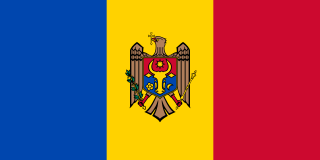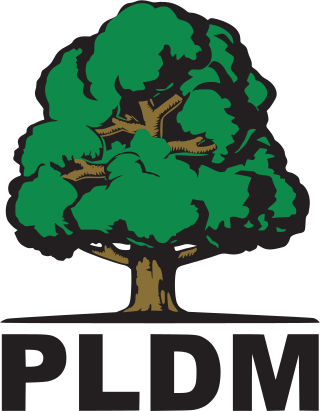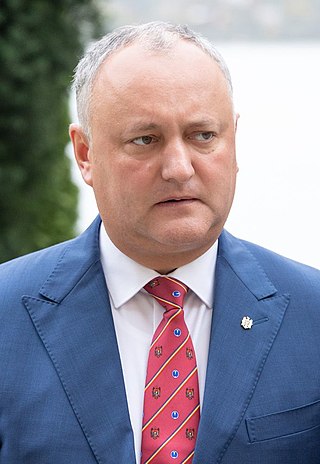The history of Moldova can be traced to the 1350s, when the Principality of Moldavia, the medieval precursor of modern Moldova and Romania, was founded. The principality was a vassal of the Ottoman Empire from 1538 until the 19th century. In 1812, following one of several Russian-Turkish wars, the eastern half of the principality, Bessarabia, was annexed by the Russian Empire. In 1918, Bessarabia briefly became independent as the Moldavian Democratic Republic and, following the decision of the Parliament, united with Romania. During the Second World War it was occupied by the Soviet Union which reclaimed it from Romania. It joined the Union as the Moldavian ASSR, until the dissolution of the USSR. In 1991 the country declared independence as the Republic of Moldova.


The Commonwealth of Independent States (CIS) is a regional intergovernmental organization in Eurasia. It was formed following the dissolution of the Soviet Union in 1991. It covers an area of 20,368,759 km2 (7,864,422 sq mi) and has an estimated population of 239,796,010. The CIS encourages cooperation in economic, political and military affairs and has certain powers relating to the coordination of trade, finance, lawmaking, and security, including cross-border crime prevention.

Transnistria, officially the Pridnestrovian Moldavian Republic (PMR), is an unrecognised breakaway state that is internationally recognised as a part of Moldova. Transnistria controls most of the narrow strip of land between the Dniester river and the Moldovan–Ukrainian border, as well as some land on the other side of the river's bank. Its capital and largest city is Tiraspol. Transnistria has been recognised only by three other unrecognised or partially recognised breakaway states: Abkhazia, Artsakh and South Ossetia. Transnistria is officially designated by the Republic of Moldova as the Administrative-Territorial Units of the Left Bank of the Dniester or as Stînga Nistrului. In March 2022, the Parliamentary Assembly of the Council of Europe adopted a resolution that defines the territory as under military occupation by Russia.

Gagauzia or Gagauz-Yeri, officially the Autonomous Territorial Unit of Gagauzia (ATUG), is an autonomous territorial unit of Moldova. Its autonomy is ethnically motivated by the predominance in the region of the Gagauz people, who are primarily Orthodox Turkic-speaking people.

According to the Moldovan law on territorial administrative organisation, Moldova is divided administratively into the following administrative territorial units: districts, cities/towns and villages. The administrative territorial organization of Moldova is made on 2 levels:
- villages (communes), sectors and cities/towns (municipii) constitute the first level,

The politics of Transnistria, a de facto independent state situated de jure within the Republic of Moldova in Eastern Europe, take place in a framework of a semi-presidential republic, whereby the President of Transnistria is head of state and the Prime Minister of Transnistria is head of government. Executive power is exercised by the government. Legislative power is vested in both the government and parliament. Formally, Transnistria has a multi-party system and a unicameral parliament, called the Supreme Council. The president is elected by popular vote. The latest parliamentary elections were held in December 2010; however, they were not monitored by international organizations such as Organization for Security and Co-operation in Europe (OSCE), which has expressed doubts about the level of democracy in the region, and were not recognized by other countries.

The European Social Democratic Party is a centre-left, populist social-democratic political party in Moldova. Established in 1997, the party holds pro-European views, and is an associate member of the Party of European Socialists (PES) and a full member of the Socialist International. According to its statute, the PSDE pleads that Moldova is an independent, sovereign, and democratic state, based on law, and integrated in the united family of European democracies. Reflecting former leader Marian Lupu's views, but also the strong influence of the Moldovan Orthodox Church, the party is more conservative on social issues, such as LGBT rights.

The Social Democratic Party is an extra-parliamentary political party in Moldova currently led by Victor Șelin.

Serafim Urechean is a Moldovan politician. He held the position of general mayor of Chișinău municipality (1994–2005) and interim prime minister of the Republic of Moldova. He was the chairman of the party Our Moldova Alliance (2003–2011), first deputy chairman of the Parliament of the Republic of Moldova (2009–2010) and president of the Court of Accounts of the Republic of Moldova (2011–2016).

The state of affairs with human rights in Transnistria has been criticized by several governments and international organizations. The Republic of Moldova, and other states and non-governmental organizations (NGOs) claim that the government of Transnistria is authoritarian and has a record of arbitrary arrest and torture.
Christopher Newbury is a British Conservative politician. He was a member of the Congress of the Council of Europe from 1998 to 2010 and since 2009 has been a member of the new Wiltshire Council, created that year.

Parliamentary elections were held in Moldova on 5 April 2009. The Party of Communists of the Republic of Moldova (PCRM) won a majority of seats for the third consecutive occasion. Turnout was 59%, exceeding the 50% necessary for the election to be valid.

The Liberal Democratic Party of Moldova is a conservative political party in Moldova. The party is led by Tudor Deliu. Until 2016, PLDM was led by Vlad Filat, who was Prime Minister of Moldova from 2009 to 2013, in two cabinets. Immediately after the 2014 parliamentary elections, with 21 seats in the Moldovan Parliament, PLDM was the largest of the three democratic pro-European parliamentary parties.

Marian Lupu is a Moldovan economist and politician who was the President of the Parliament of Moldova between 2010 and 2013. From this position he served as Acting President of the Republic from 2010 until 2012.

Ion Cebanu is a Moldovan politician. He was Minister of Youth and Sports between 25 September 2009 and 26 February 2013 in the First Vlad Filat Cabinet and in the Second Filat Cabinet as well, President of the Liberal Party Territorial Organization, Centru branch of Chisinau, member of the Central Permanent Bureau of the Liberal Party, president of the Public Association "Optimus".
Veaceslav Iordan is a Moldovan politician who served as interim Mayor of Chișinău from January–June 2007.
Vasile Ursu is an engineer and is a Moldovan politician, the MP at the first Parliament of the Republic of Moldova in 1990-1994, acting interim general mayor of Chișinău in 2005-2007 and minister of transport and road management for 2007-2008. In 2008-2009 he held the position of Deputy Minister of Construction and Territory Development.

Igor Dodon is a Moldovan politician who previously served as the president of Moldova from 23 December 2016 to 24 December 2020. He currently serves as the leader of the Party of Socialists of the Republic of Moldova. He served as minister of trade and economics in the governments of Vasile Tarlev and Zinaida Greceanîi from September 2006 to September 2009 and was a member of the Parliament of Moldova from 2009 to 2016. He lost his bid for re-election in 2020 to Maia Sandu in a rematch whom he had defeated four years earlier in 2016.














